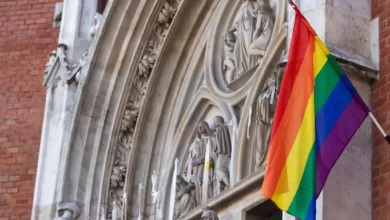JD Greear Blasphemously Claims Jesus Said “The Crucifixion was a Project Between Those on the Left and the Right”

Last week, the Gospel Coalition aired an interview with former Southern Baptist President JD Greear in which Greear attempted to downplay the differences between the political left and right as secondary issues. When asked if there is one thing Greear would change about the Southern Baptist Convention, Greear stated the following:
“My political answer is, I just find a tendency in every generation to turn things besides the gospel into the central thing. And that happens to good people…[for] Southern Baptists, our defining narrative is resisting liberalism. And praise God for that…Then there’s other leaven Jesus talks about. Jesus’ crucifixion was a joint project between, you know, those on the left and those on the right. And to say, can we be like the Gospel Coalition’s audience, like evangelicals at large? Can we be a people defined by the gospel and not by secondary political alignments? And I’m not trying to back off there with pro-life or the importance of gender and marriage. I mean, yes to all that, and to all that, you proclaim that loudly. But can we be defined as a missionary people who are big on the gospel and not build our identity on these other things?”
With no biblical chapter or verse, Greear claims that Jesus said that the crucifixion was a project for those between the left and on the right. The reason why he failed to mention a biblical passage on that is because Jesus never said that.
In addition to misquoting the Lord, Greear also seems to be contradicting himself. On the one hand, he states that liberalism is something he is grateful Christians pushed back on historically. But on the other hand, he states that being on the political left is a “secondary political alignment” and should not be placed above the gospel. In the context of the quote, Greear is making a distinction between theological and political liberalism. Theological liberalism refers to people who deny the inerrancy of the Bible and the deity of Christ, whereas political liberalism is being aligned with the policy prescriptions of the Democratic Party. It seems that Greear is okay with vigorously opposing theological liberalism, but opposition to political liberalism should be done secondarily, while the gospel is elevated to the forefront, so that both political conservatives and liberals can worship together in the same church.
Greear is correct that political issues are not the gospel, nor should they take priority above the gospel message. If someone does not repent and believe in the God-man Jesus Christ who died for their sins, their soul is damned regardless of political affiliation. The error here is that Greear is misapplying the correct response to the gospel: repentance. One who hears the gospel must turn from their sin by faith alone in Christ. Allowing someone who believes in the Democratic Party’s platform is to give them a gospel that does not require repentance. This is because issues such as abortion, homosexuality, and racial partiality are sin issues to be repented of. Making political affiliation a secondary issue denies liberals the repentance they so desperately need, as well as the liberating effect of the gospel.




